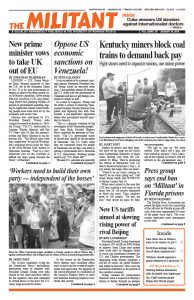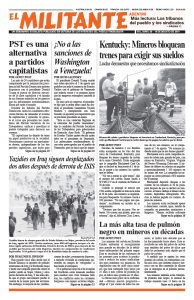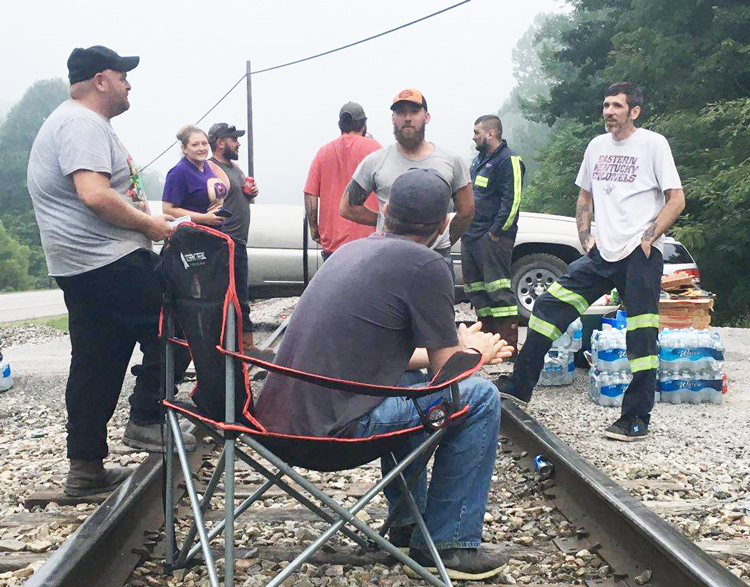Dozens of miners and their families have set up camp on rail tracks near Cumberland, Kentucky, to block trains hauling coal from the Cloverlick #3 Mine. They’re protesting the refusal of Blackjewel Coal Co, which declared bankruptcy July 1, to pay miners the wages they are owed.
“There’ll be no trains coming in, there’ll be no trains going out,” coal miner Shane Smith told WYMT-TV in Harlan County July 30.
When word spread in the area that CSX was loading a coal train at the mine July 26, six miners organized to block the train. Their numbers grew to 100 people. “No pay, we stay,” they wrote on signs by their tent encampment.
“We had to step up. We were robbed. They didn’t use a gun, but they robbed us anyway,” Chris Lewis, one of the original six miners, told the Militant at the encampment Aug. 7. “We have to give a voice to coal miners. We aren’t asking for nothing we haven’t worked for,” he said.
Blackjewel was the country’s sixth-largest coal mining company, owning mines in Kentucky, Virginia, West Virginia and Wyoming. It owes some $11 million in unpaid wages to about 1,100 miners in the eastern mines. The company has locked out 600 miners in Wyoming.
Blackjewel deposited checks to miners’ accounts June 28, but after it declared bankruptcy the bank deducted the money from the accounts, leaving them overdrawn. Some miners said that bills had already been paid with the money.
Support and donations to the protesting miners are pouring in — food, water, tents, a generator, camping supplies and lights. “We’ve got enough pizzas to feed probably the whole city of Harlan … it’s wonderful to see how much our community really sees that what we’re trying to do is right,” miner Austin Watts told the media.
Several retired UMWA members visited the protest July 30. “We’re UMWA members,” Stanley Sturgill, 74, and a 41-year member of the union, told the Mountain Eagle. “Those guys aren’t. There’s no UMWA in Kentucky anymore, but we’re all brothers.”
Carl Shoupe, a retired miner from UMWA Local 7425, told the Militant, “I’ve been down there several times, I’m with them 100%.”
James Gibbs, UMWA vice president at-large, “vowed the UMWA will help these men in any way they can,” reported WYMT. CSX officials reached an agreement with the miners to move the locomotive engines but leave the train cars loaded with coal, according to the Brotherhood of Locomotive Engineers and Trainmen website.
Most of the miners are owed pay for three weeks and a day of work. They also have been unable to access their 401(k) retirement savings, and have lost health care benefits.
The miners want their pay and benefits at the top of the list of debts Blackjewel owes that includes business debts, taxes, mining royalties and fines for mine safety and land reclamation violations.
Dozens of miners headed to Charleston, West Virginia, Aug. 5 in a “Pay the Miners First” caravan to protest at a hearing held to approve the sale of the mines and its assets to other mining companies.
A lawyer representing the miners at the bankruptcy hearing addressed some 100 miners, families and supporters at the encampment Aug. 7. When the lawyer mentioned “partial payments,” one of the miners called out to everyone saying, “We’re staying here. Go home and take a shower and do whatever you have to do, but come back. We’re staying here.”
Miners in Harlan County have a long record of struggle — including bloody union-organizing battles in the 1930s, the historic Harlan County strike of 1973-74, and fights waged by miners across the country to establish a large measure of control over working conditions and enforce safety in the 1970s.
Alyson Kennedy, the Socialist Workers Party 2016 candidate for president, and a coal miner for 14 years, told the Militant, “Miners fighting for the pay they are owed deserve the support of working people and trade unions across the country. Defense of fights like these is essential to strengthening the unity of the working class.
“The SWP fights for a federal government-funded public works program to put millions back to work at union-scale wages building roads, bridges, hospitals and quality affordable housing that workers need,” Kennedy explained. “We support workers’ struggles to organize, and strengthen unions so we can use union power to take on coal companies like Blackjewel.”
Jacquie Henderson and Ned Measel in Cumberland, Kentucky, and Arlene Rubinstein in Washington, D.C., contributed to this article.


